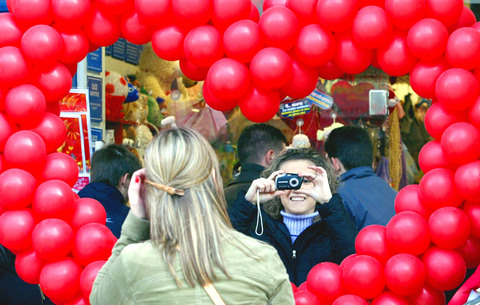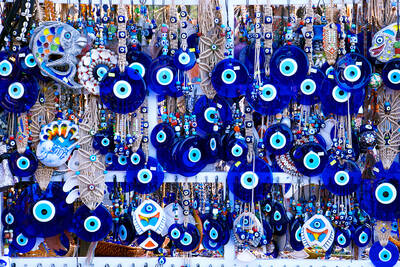In most cultures, the heart is considered more important than the brain. This is especially true in English, where there are many phrases about the heart.
For example, if you are very mad at your friend Jim and dislike him strongly, but you change your mind and decide he is not so bad, people will say, "You had a change of heart."
If you take a test, but your grade is not very good and you want to quit studying, you can say, "I've lost heart." That means you are feeling discouraged.

PHOTO: AP
If you are a quiet person who doesn't often share your feelings, but you decide to tell your teacher or friend how you are feeling, then we say you have "opened your heart" by talking to others.
Chinese and English alike have lots of sayings about the heart. Can you think of any others? (Jason Cox, Staff Writer)
多數文化中,人們認為心比腦更重要。英文中尤其如此,許多片語都與心有關。
例如,假如你很氣你的朋友吉姆,非常討厭他,但你又改變心意,覺得他沒那麼壞,人們可能會說︰「You had a change of heart」。
假如你參加考試,但成績很不理想,你不想再讀書了,你就可以說︰「I've lost heart」,意指你感到喪志了。
假如你話不多,不常表達感情,但你打算告訴老師或朋友你的感受,我們就可以說你「打開心扉」與別人交談。
中文與英文同樣有很多關於「心」的說法。你能想到其他用法嗎?
(翻譯:賴美君)

Rice is essential to Japanese culture, tradition and politics. People take pride in the oval-shaped sticky Japonica grain, which is still a staple even though total consumption has fallen over the decades. But since last summer, prices have soared as supplies have fallen short of demand. The government has long paid farmers to cut back on rice acreage, and change to other crops to keep rice prices relatively high. To cope with shortfalls this year, the government has released rice reserves. But the grain has been slow to reach supermarket shelves. Anger over that was part of the reason the Agriculture Minister

Step into any corner of Turkiye, and you’ll likely encounter the iconic “Evil Eye,” known as “nazar boncu?u” in Turkish. This striking blue glass ornament is shaped like an eye with concentric circles of dark blue, white, and light blue. While its name in English suggests something threatening, it’s actually a charm designed to ward off misfortune. The origins of the nazar boncu?u can be traced back to ancient Mediterranean and Middle Eastern traditions. The word nazar comes from Arabic, meaning “gaze,” while boncu?u translates to “bead” in Turkish. Central to the nazar boncu?u’s mythology is the idea that

Continued from yesterday(延續自昨日) https://www.taipeitimes.com/News/lang In 1946, the company adopted the name 7-Eleven to reflect its newly extended __3__, from 7am to 11pm, a novel concept at the time. As a rapidly growing company, it began offering franchise opportunities in the 1960s. In 1974, the first 7-Eleven in Japan was opened by the supermarket company Ito-Yokado. The Japanese franchises were __4__ successful that by 1991, Ito-Yokado was able to acquire a 70 percent stake in Southland Corporation. Its investments eventually resulted in full ownership of 7-Eleven, which paved the way for the Japanese company to enter the international market. Since then, 7-Eleven

A: Wow, Les Miserables Staged Concert Spectacular is visiting Taiwan for the first time. B: Isn’t Les Miserables often praised as one of the world’s four greatest musicals? A: Yup. Its concert is touring Taipei from tonight to July 6, and Kaohsiung between July 10 and 27. B: The English version of the French musical, based on writer Victor Hugo’s masterpiece, has been a huge success throughout the four decades since its debut in 1985. A: The musical has never toured Taiwan, but going to the concert sounds like fun, too. A: 哇,音樂劇《悲慘世界》紀念版音樂會首度來台巡演! B: 《悲慘世界》……它不是常被譽為全球四大名劇之一嗎? A: 對啊音樂會將從今晚到7月6日在台北演出,從7月10日到27日在高雄演出。 B: 這部法文音樂劇的英文版,改編自維克多雨果的同名小說,自1985年首演以來,在過去40年造成轟動。 A: